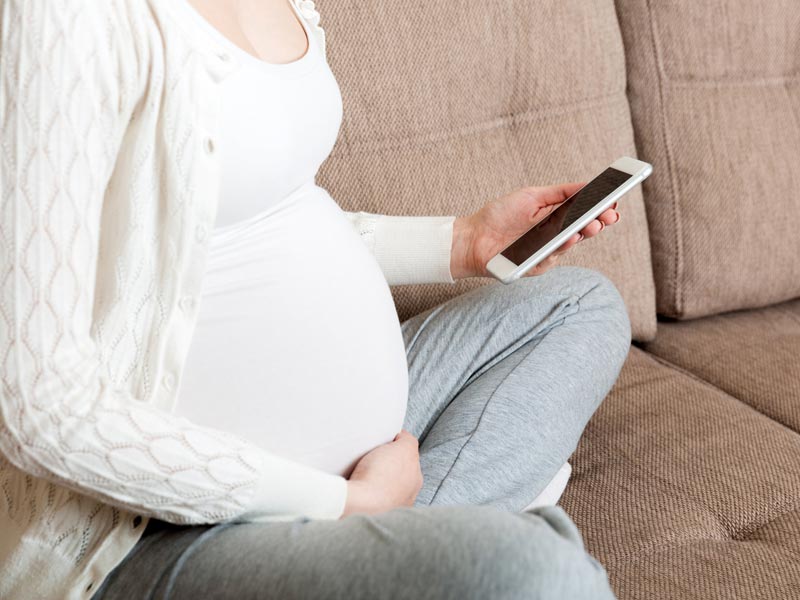New Maternal Mental Health Hotline Launches
New and Expecting Mothers Get Free Counseling, Other Resources
May 12, 2022, 8:43 a.m. Michael Devitt — While there are plenty of reasons to celebrate Mother’s Day, one that is sometimes overlooked is that in the United States, each year Mother’s Day officially kicks off National Women’s Health Week.

For women, this week represents an opportunity to focus on their health needs and take steps to achieve better health in the weeks and months to come. For family physicians and other health care professionals, it’s a time to encourage women to prioritize their health and help them find ways to stay active and healthy. These are important points given two other often-overlooked facts — that women comprise two out of every three caregivers in the United States and that many women who are pregnant or recently had children may experience a range of mental health conditions.
To help women maintain not only their physical health but also their mental and emotional well-being, the Biden administration created the National Maternal Mental Health Hotline. Launched on Mother’s Day this year, the new, confidential hotline connects new and expecting mothers experiencing mental health challenges with counselors to provide real-time mental health support 24 hours a day, seven days a week at no charge.
“The Biden-Harris administration has a bold vision for changing the way we address, treat and integrate mental health — both in and out of health care settings,” said HHS Secretary Xavier Becerra. “This new maternal mental health hotline will not only advance our priorities of tackling the nation’s mental health crisis, but also support our efforts to ensure healthy pregnancies and support new parents.”
Story Highlights
Additional Details
The hotline is accessible by phone or text at 1-833-943-5746 (or 1-833-9-HELP4MOMS) in English and Spanish. Those who are deaf, hard of hearing or have a severe speech impairment can use a preferred relay service or dial 711 and then dial the hotline. [Editor's note: The Health Resources & Services Administration has introduced an updated, toll-free number that is being used moving forward. The updated phone number is 1-833-TLC-MAMA (1-833-852-6262).]
According to the Health Resources & Services Administration, individuals who contact the hotline will have access to an array of resources, including professional counselors who are culturally sensitive and trauma informed, evidence-based information on maternal health, referrals to support groups and community organizations, and interpreter services in 60 languages.
The hotline was launched with an initial $3 million in funding. Provisions currently in the president’s 2023 budget would more than double that initial investment, allowing HRSA to expand the number of hotline staffers and build additional capacity in future phases.
“We are going to continue to grow our investments in this resource, as we know it’s what women need,” said HRSA Administrator Carole Johnson.
Additional information on the hotline is available through an HRSA FAQ page.
It should be noted that the National Maternal Health Hotline is not intended to be an emergency response line. People who are experiencing a behavioral health crisis can contact the National Suicide Prevention Lifeline at 1-800-273-8255.
Family Physician Perspective
Alexis “Alex” Vosooney, M.D., of West St. Paul, Minn., chair of the Academy’s Commission on Health of the Public and Science, explained to AAFP News the significance of the hotline and what it could mean for family physicians who provide maternal care.
“Due to the demands mothers face on their schedules both inside and outside the home, a 24-hour hotline allows a mother to make contact when it’s most convenient for her,” Vosooney said. “Family physicians should welcome tools that can improve patient access to resources and information.
“However a patient chooses to make contact — an office visit, a telehealth visit, the internet or a hotline — the ultimate goal of those points of contact is the same: to decrease stigma, offer information and help the patient in their journey to improve their mental health.”
More on Maternal Mental Health
The National Maternal Mental Health Hotline reflects a number of initiatives from the administration to improve maternal mental health, as well as health outcomes for women and infants.
Last month, HHS announced roughly $16 million in awards to strengthen Maternal, Infant and Early Childhood Home Visiting programs in eight states, along with up to $9 million in grant funding to expand the State Maternal Health Innovation and Data Capacity Program, and up to $4.5 million in funding to support community-based doulas in areas with high adverse maternal outcomes and infant health outcomes. HHS is also providing funding to seven states to support a maternal depression and related behavioral disorders screening and treatment program.